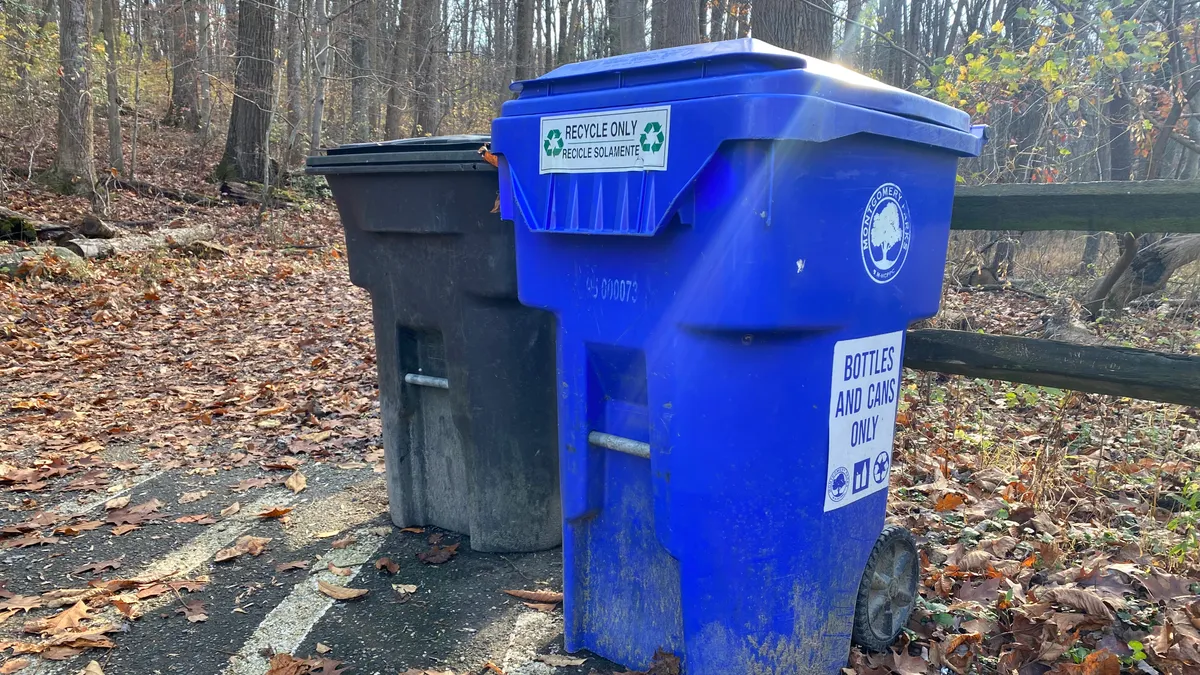Dive Brief:
- Maryland’s extended producer responsibility advisory council is still in the midst of drafting recommendations for the state legislature, which are meant to inform a future EPR for packaging bill.
- The group is awaiting the completion of a state recycling needs assessment, conducted by environmental firm HDR, to help direct its recommendations. At an advisory council meeting Dec. 5, the group decided to wait for the information contained in the needs assessment before finalizing any recommendations, noting that the state must first have a clear picture of its recycling and waste management systems before trying to write detailed EPR guidelines.
- A state law passed in Maryland in 2023 called for the advisory group to deliver EPR policy recommendations to the state’s legislature by Dec. 1, 2024, but the law also required Maryland Department of the Environment to complete the needs assessment prior to that December deadline. The process was delayed, in part due to the time it took to fund the needs assessment and choose HDR as the vendor for the project.
Dive Insight:
Maryland has not officially passed an EPR for packaging law, but the EPR advisory council’s work is an important part of the process of eventually introducing such legislation.
The state is working through complex packaging EPR details five states that have already passed their own EPR for packaging laws. Maine and Oregon last week both adopted final rules for their respective EPR for packaging laws. California, Colorado and Minnesota also have EPR for packaging laws in progress.
MDE hired HDR in August to complete the needs assessment, though the law had previously required the assessment’s results to be published by the end of July. It’s unclear when the assessment could be released, though council members at the meeting estimated it could come sometime in January.
Details of the forthcoming needs assessment are expected to give an overview of state waste and recycling infrastructure and capacity, as well as key costs and revenues. It is also expected to provide data on disposal and recycling methods by material type and amount, as well as estimates of how many materials are currently not being recycled.
The assessment is also meant to offer details on numerous other aspects, including state organics recycling capacity, reuse opportunities, recycling education programs, employment opportunities and ideas for making recycling systems more equitable for underserved residents.
Once that assessment is released, “I think we have a great opportunity in the next year to fashion a bill,” said Chaz Miller, an advisory council member representing the Maryland Recycling Network.
The advisory council began meeting in May. It’s made up of 21 members, including recyclers, processors and composters from both the public and private sectors, and representatives from local government agencies, PROs and the consumer goods sector.
At their Dec. 5 meeting, council members debated briefly about whether to base future recommendations on models from the other states with EPR for packaging laws, though members also pointed out the forthcoming needs assessment would offer perspective that would help inform that choice.
“There are states that are going through this before us, and we can absolutely learn from their lessons, what works and what doesn't work, as we start to go through this journey,” said Bradley Baker, an MDE program manager, during the meeting.
Members also debated whether to recommend that state lawmakers wait until the 2026 legislative session to introduce an EPR for packaging bill, though several members acknowledged there was a possibility that lawmakers could decide to push forward legislation before seeing the council’s final recommendations. Others said that asking lawmakers to delay to 2026 could unnecessarily slow the process of passing an EPR bill.
Also up for future decision-making is whether the Circular Action Alliance, the producer responsibility organization for Maryland, would eventually reimburse MDE for the cost of the needs assessment, and on what kind of timeline.
The council will continue to work collaboratively as it awaits future details of the needs assessment, said Michael Okoroafor, a council member and chief sustainability officer of McCormick & Company. The group will meet again on Dec. 17.
“We may not solve every aspect of what we need to put in place for Maryland, but it is important that, as we drive forward, we focus on the framework strategy that will guide everything,” he said.
This story first appeared in the Waste Dive: Recycling newsletter. Sign up for the weekly emails here.










